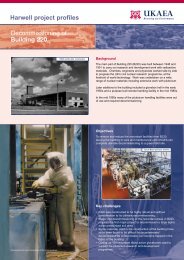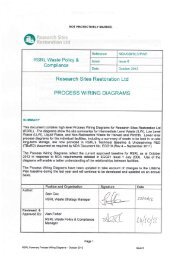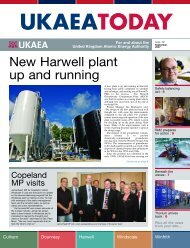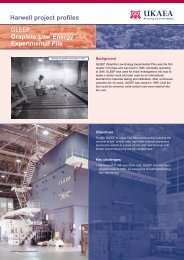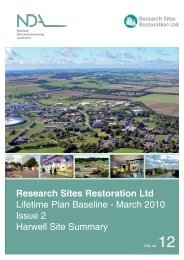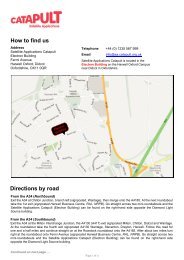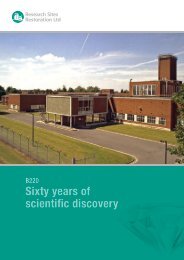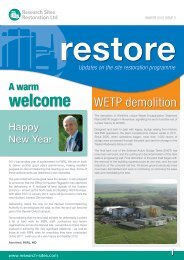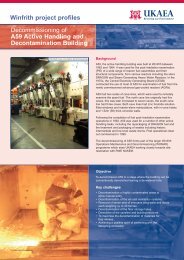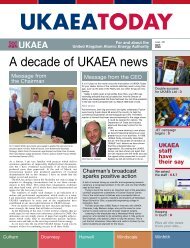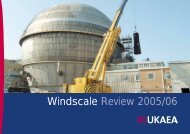RSRL Integrated Waste Strategy - Issue 5- Oct 2012.pdf
RSRL Integrated Waste Strategy - Issue 5- Oct 2012.pdf
RSRL Integrated Waste Strategy - Issue 5- Oct 2012.pdf
Create successful ePaper yourself
Turn your PDF publications into a flip-book with our unique Google optimized e-Paper software.
NOT PROTECTIVELY MARKEDSite <strong>Waste</strong> Management Plans (SWMP)The Site <strong>Waste</strong> Management Plans Regulations 2008 require construction sites to produce aplan that details the amount and type of waste that will be produced and how it will be reused,recycled, or disposed of. The plan is updated during the construction or demolition process torecord how the waste is managed and to confirm the disposal of any materials that cannot bereused or recycled at a legitimate site. <strong>RSRL</strong> procedure PRC0199 requires projects tocomplete a SWMP for each project with a value in excess of £300k. The <strong>RSRL</strong> IWS is used tocomplement the detailed given by project SWMPs.<strong>Waste</strong> Framework Directive 2008/98/ECIn 2004 the European Commission produced a proposal to revise the <strong>Waste</strong> FrameworkDirective (2006/12/EC) to differentiate clearly between recovery and disposal and to clarify thedistinction between waste and non-waste. It also introduced procedures for establishingminimum quality standards and required Member States to develop national waste preventionprogrammes.The 2008/98/EC Directive will repeal and replace the <strong>Waste</strong> Framework Directive (2006/12/EC),the Hazardous <strong>Waste</strong> Directive (91/689/EEC) and the <strong>Waste</strong> Oils Directive (75/439/EEC). Theapproach takes into account the whole life-cycle of products and materials and not only thewaste phase, and focuses on reducing the environmental impacts of waste generation andwaste management, thereby strengthening the economic value of waste. Member States mustimplement this Directive in national legislation by 12 December 2010.In 2010, Defra and the Welsh Assembly Government (WAG) invited views on the second stageconsultation on the transposition of the revised <strong>Waste</strong> Framework Directive (rWFD) in Englandand Wales which concluded in September 2010.The new <strong>Waste</strong> (England and Wales) Regulations 2011 came into force on 29 March 2011.They update some aspects of waste controls. The need for waste permits and authorisations forcertain activities therefore does not change. Most radioactive waste is controlled throughregulation as radioactive waste. All wastes which are outside of the scope of regulation asradioactive waste fall within the scope of regulation as Controlled <strong>Waste</strong> according to the new<strong>Waste</strong> (England and Wales) Regulations.Fluorinated Greenhouse Gases Regulations 2008Most fluorinated gases are very powerful greenhouse gases which contribute to global warmingif emitted to the atmosphere. The relevant gases that fall under the EC Regulation are:hydrofluorocarbons (HFC), perfluorocarbons (PFC), and sulphur hexafluoride (SF6).The Fluorinated Greenhouse Gases Regulations came into force on 15 February 2008 andprescribe offences and penalties to infringements of the following provisions:• Leakages• Leakage checking and leak detection systems• Record keeping• Instruction manuals• Recovery of gases• Existing qualifications for personnel working on equipment<strong>RSRL</strong> IWS (<strong>Issue</strong> 5 – <strong>Oct</strong>ober 2012)114



